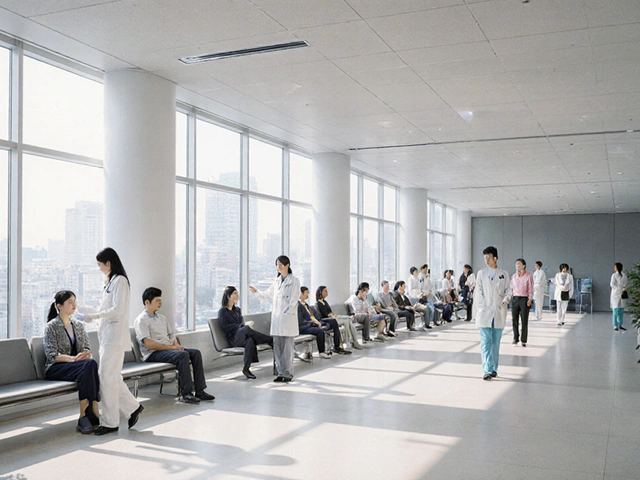- Home
- Medical Tourism
- Which Country Has the Best Healthcare System in the World?

Which Country Has the Best Healthcare System in the World?
Healthcare Cost Comparison Calculator
Compare Healthcare Costs
Cost Comparison
Japan vs. Your Country
Best ValueWhy Japan?
Japan provides high-quality care at approximately half the cost of the US while maintaining the highest life expectancy in the world (84.7 years for men, 87.7 for women). Their fixed-fee system eliminates unnecessary procedures and ensures universal coverage.
Key Benefits
- Lowest cancer mortality rates in OECD
- Average wait time for routine care: under 1 week
- No insurance barriers - every citizen is covered
- Fixed pricing prevents surprise bills
When people ask which country has the best healthcare system, they’re not just looking for a number on a list. They’re asking: Where can I go if I need life-saving care, fast service, and real results? It’s not about fancy hospitals or expensive advertising. It’s about outcomes-how long people live, how often they get treated before it’s too late, and whether the system works for everyone, not just the wealthy.
In 2025, the answer isn’t surprising if you’ve been paying attention: Japan holds the top spot for quality healthcare. Not because it spends the most money, but because it delivers the most value. Japan has the highest life expectancy in the world-84.7 years for men and 87.7 for women. That’s longer than any other country. And it’s not just about living longer. It’s about living well. Fewer people in Japan suffer from chronic pain, disability, or preventable hospitalizations than in the U.S., Germany, or even Switzerland.
How does Japan do it? It’s not magic. It’s structure. Every citizen is required to enroll in a public health insurance plan. There are no uninsured people. Doctors are paid by the government using a fixed fee schedule, which means they don’t profit from running more tests or procedures. That cuts down on unnecessary care. Patients can go to any hospital or clinic without a referral. Wait times for routine care? Often under a week. For urgent cases? Same day. And the cost? About half of what the U.S. spends per person-$4,000 a year versus $12,000.
But Japan isn’t the only player. If you’re considering medical tourism, you need to know the full picture. The U.S. leads in cutting-edge technology and specialized treatments like robotic surgery and gene therapy. If you need a rare cancer drug or an experimental stem cell therapy, you’ll find more options in Boston, Houston, or Los Angeles than anywhere else. But here’s the catch: you’ll pay $50,000 to $200,000 for procedures that cost $10,000-$25,000 in Germany or South Korea. And you’ll likely wait weeks just to get an appointment with a specialist.
Germany comes in second for overall quality. Its system is a mix of public and private insurance. Patients get fast access to specialists, top-tier hospitals, and rigorous safety standards. German surgeons have some of the lowest complication rates in Europe. For joint replacements, heart bypasses, or spinal surgeries, Germany is a top destination for medical tourists from the UK, Russia, and the Middle East. The country also has a strong focus on prevention. Regular check-ups are covered, and doctors are incentivized to keep patients healthy-not just treat them when they break.
South Korea is the dark horse. In the last 15 years, it went from a developing healthcare system to one of the most advanced. Its hospitals are modern, clean, and packed with technology. Korean clinics specialize in cosmetic surgery, cancer screening, and fertility treatments-areas where medical tourists flock. The success? High-tech diagnostics. A full-body MRI scan in Seoul costs $600. In the U.S., it’s $3,000. And the results? South Korea has the lowest cancer mortality rate in the OECD, thanks to early detection programs that screen 90% of its population for stomach, liver, and colorectal cancers by age 45.
Switzerland and Norway are often mentioned too. Switzerland has private insurance that’s expensive but efficient. Wait times are short, and the staff is professional. But if you’re not a resident, you’ll pay full price-no discounts. Norway’s system is free at the point of care, funded by taxes. But it’s hard to get non-emergency procedures quickly. A hip replacement might take 6-8 months. For medical tourists, that’s a dealbreaker.
So who wins? Japan, by a mile. But the best country for you depends on what you need.
What kind of care are you looking for?
If you need routine surgery-like a knee replacement, cataract removal, or hernia repair-Japan and Germany are your safest bets. Both have lower infection rates than the U.S. and Canada. Recovery times are faster. Follow-up care is included. And the language barrier? Minimal. Most hospitals in Tokyo, Osaka, Berlin, and Munich have English-speaking staff.
If you’re seeking cancer treatment, South Korea and Germany lead in early detection and survival rates. South Korea’s national cancer screening program catches tumors before they spread. Germany’s oncology centers are among the most research-driven in the world. Both countries offer second-opinion services for international patients at no extra cost.
If you want cosmetic surgery, South Korea is still the global leader. Over 1 million cosmetic procedures are performed there each year. The country has more board-certified plastic surgeons per capita than any other. The results are natural-looking, and complications are rare. Many clinics even offer post-op recovery packages with hotel stays and translation services.
If you’re after fertility treatments, Spain and the Czech Republic are better choices than Japan or Germany. Spain allows egg donation from anonymous donors, which is banned in Germany. The Czech Republic has lower costs and high success rates for IVF. But if you’re from the U.S. or UK, you’ll still need to factor in travel, visas, and legal paperwork.
What’s the real cost of healthcare abroad?
Let’s say you need a hip replacement. In the U.S., it costs $45,000-$60,000. In Japan? Around $15,000. In Germany? $14,000. In South Korea? $12,000. You save $30,000 or more. And that’s not all. Many hospitals offer all-inclusive packages: surgery, hospital stay, translator, airport pickup, even a week of hotel accommodation. You can fly economy, stay in a clean hotel, and still come out ahead.
But beware of hidden traps. Some clinics abroad offer “discounts” for cash payments-but don’t provide medical records in English. Others use unlicensed staff or outdated equipment. Always check if the hospital is accredited by the Joint Commission International (JCI). There are only 200 JCI-accredited hospitals worldwide. Japan has 42. Germany has 38. South Korea has 26. The U.S. has 180, but most are for domestic patients.

Why not the U.S.?
The U.S. spends more on healthcare than any other country. It has Nobel Prize-winning doctors and the most advanced labs. But it’s broken for most people. One in four Americans skip care because of cost. Emergency room visits for non-emergencies are common because primary care is too expensive. The average wait to see a specialist? 24 days. For a surgeon? 42 days.
And outcomes? The U.S. has the highest maternal mortality rate among wealthy nations. It has the highest rate of preventable deaths. Life expectancy? Lower than Cuba. That’s not a typo.
If you have insurance and live in a big city, you might get great care. But if you’re an international patient without U.S. insurance? You’re on your own. And the bills? They’re designed to scare you.

What should you do next?
Don’t pick a country because it’s popular. Pick it because it matches your needs.
- For affordable, reliable, universal care: Go to Japan.
- For advanced cancer treatment and precision medicine: Go to Germany or South Korea.
- For cosmetic surgery: Go to South Korea.
- For fertility treatments: Go to Spain or the Czech Republic.
- For emergency or complex surgery with insurance: Stay in the U.S.-but only if you’re covered.
Check the hospital’s accreditation. Ask for patient reviews from people in your country. Get everything in writing-including what’s included, what’s not, and how complications are handled. Most reputable clinics will give you a detailed contract.
And remember: the best healthcare system isn’t the one with the most machines. It’s the one that keeps people alive, healthy, and out of the hospital for as long as possible. Japan does that better than anyone else. But the right choice for you? That depends on what you need-and how much you’re willing to pay for it.
Is Japan really the best for healthcare, or is this just a myth?
Japan isn’t just ranked #1-it’s proven it. The World Health Organization ranked Japan as having the best healthcare system in 2023, and that hasn’t changed. Life expectancy is the highest in the world, preventable deaths are the lowest, and out-of-pocket costs for patients are among the lowest in the developed world. It’s not a myth-it’s data.
Can foreigners get healthcare in Japan without insurance?
Yes, but not for free. Japan’s public system covers all residents, including long-term foreign residents. Short-term visitors can receive emergency care, but they must pay out of pocket. Many hospitals offer medical tourism packages that include treatment, translation, and lodging. You’ll pay less than in the U.S., but you’ll need to pay upfront and submit claims later if you have travel insurance.
Why is Germany better than the U.S. for surgery?
Germany has lower complication rates for surgeries like hip replacements and heart bypasses. Its hospitals follow strict infection control protocols, and surgeons are required to report outcomes publicly. In the U.S., hospitals don’t have to disclose complication rates, and surgeons are often paid per procedure, which can lead to unnecessary operations. In Germany, the focus is on patient safety-not profit.
Is South Korea safe for medical tourism?
Extremely safe. South Korea has 26 JCI-accredited hospitals and ranks #1 in the world for cancer survival rates. Its clinics are clean, modern, and staffed by English-speaking professionals. Many have dedicated international patient centers. Cosmetic surgery is highly regulated, and complications are rare. Thousands of Americans and Europeans go there every year for procedures that cost 60-80% less than at home.
What’s the cheapest country for a knee replacement?
South Korea offers the lowest price at around $12,000, including hospital stay and follow-up. Japan is close behind at $15,000. Germany is $14,000. In the U.S., it’s $45,000-$60,000. If you’re paying out of pocket, South Korea is the most cost-effective option with top-tier results.
Should I go to India or Thailand for cheaper care?
India and Thailand offer lower prices-sometimes half of South Korea’s-but quality varies wildly. Only a handful of hospitals in those countries are JCI-accredited. Infection rates are higher, and follow-up care is often inconsistent. If you’re looking for affordability and are willing to take more risk, they’re options. But if you want reliability, safety, and proven outcomes, Japan, Germany, and South Korea are better choices.
If you’re considering medical travel, start with your diagnosis. Then match it to the country with the strongest track record in that area. Don’t chase the lowest price. Chase the best outcome. That’s how you win.

Arnav Singh
I am a health expert with a focus on medicine-related topics in India. My work involves researching and writing articles that aim to inform and educate readers about health and wellness practices. I enjoy exploring the intersections of traditional and modern medicine and how they impact healthcare in the Indian context. Writing for various health magazines and platforms allows me to share my insights with a wider audience.
About
Medical Resource Center India is a comprehensive online platform dedicated to providing reliable health information and medical resources in India. Explore a wide range of articles, tips, and advice on medicine, healthcare services, and wellness. Stay informed about the latest developments in Indian medicine and access valuable insights into maintaining a healthy lifestyle. Discover expert guidance and health solutions tailored for every Indian citizen. Your go-to destination for authoritative medical knowledge in India.



